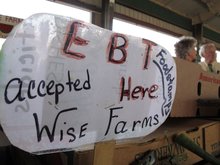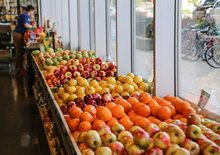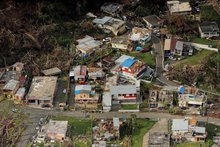Found 97 resources.
0
0
0
The Addressing Healthcare’s Blindside in Albuquerque’s South Side (AHBASS) collaborative participated in the BUILD Health Challenge’s first cohort with the intention of “making the healthy choice, the easy choice” for community members. Now you can learn about their strategies, approaches, application of the BUILD principles, and outcomes in this new case study documenting their work. Follow along in this case study and see how this Albuquerque, NM, based team addressed chronic disease and self-management in their community. Together, they established a multi-sector collaboration that...
Topics: Data sharing, Food insecurity, Health, Low-income, Nutrition, Partnerships
0
0
0
More low-income children across the country are getting the nutrition they need to learn and thrive through the School Breakfast Program, according to the annual School Breakfast Scorecard, released by the Food Research & Action Center (FRAC).
Topics: Child welfare, Food insecurity, Health, Low-income, Nutrition
 Shared by Housing Is
on Feb 14, 2019
Shared by Housing Is
on Feb 14, 2019 0
0
0

Square, the financial technology company known best for its slick iPad transactions, said Thursday it provided the funds to Austin’s Novo Dia Group to ensure that recipients of the Supplemental Nutrition Assistance Program (SNAP) can use their benefits at farmers markets without interruption. The investment also gives Square a window into the lucrative market for SNAP benefits, worth $63 billion annually.
Topics: Food insecurity, Low-income, Nutrition, Partnerships
0
0
0

Lack of transparency about SNAP benefits leaves students confused, unable to take advantage of resources
Topics: Food insecurity, Low-income, Nutrition, Post-secondary, Research, Youth
 Shared by Housing Is
on Feb 11, 2019
Shared by Housing Is
on Feb 11, 2019 0
0
0
As summer approaches, the West Virginia Department of Education is looking to partner with organizations in an effort to provide meals and activities for children while schools are out of session.
Topics: Education, Food insecurity, Low-income, Nutrition, Partnerships, Youth
 Shared by Housing Is
on Feb 11, 2019
Shared by Housing Is
on Feb 11, 2019 0
0
0

The U.S. territory needs to urgently tackle issues such as "widespread informal housing" and "the exorbitant amount of abandoned spaces" as it rebuilds after Hurricane Maria.
Topics: Community development, Food insecurity, Funding, Homelessness, Housing, Legislation & Policy, Nutrition, Safety, Stability, U.S. Territories
 Shared by Housing Is
on Feb 4, 2019
Shared by Housing Is
on Feb 4, 2019 0
0
0
Under the continuing resolution (CR) that provided the funding to reopen the government for three weeks, SNAP (food stamps) now is fully funded at least through March, even if the government shuts down again on February 15. Millions of families, however, face a longer-than-usual gap between their February and March benefits because the Agriculture Department worked with states to issue February benefits early during the shutdown, and that could further strain household budgets, the emergency food network, and other community resources.
Topics: Food insecurity, Funding, Health, Legislation & Policy, Low-income, Nutrition
0
0
0

Unlike elementary and secondary school students, whose families can get some support from things like federal free breakfast and lunch programs, for college students much of that assistance dries up.
Topics: Education, Food insecurity, Homelessness, Housing, Low-income, Post-secondary, Youth
 Shared by Housing Is
on Jan 28, 2019
Shared by Housing Is
on Jan 28, 2019 0
0
0
A whole host of factors — such as friends, housing and transportation — affect a person’s health and how much they need the social safety net. It’s time the government’s big health insurance programs took this reality into account, some lawmakers and policymakers are starting to argue.
Topics: Asset building, Cost effectiveness, Disabilities, Education, Food insecurity, Funding, Health, Homelessness, Housing, Legislation & Policy, Low-income, Medicaid / Medicare, Seniors, Transportation, Workforce development
 Shared by Housing Is
on Jan 25, 2019
Shared by Housing Is
on Jan 25, 2019 0
0
0
The firearm, obesity, and opioid epidemics are among the most important public health crises of our time. Each epidemic has a complex etiology that challenges efforts at mitigation. From this, a central question arises for researchers, clinicians, and policymakers: How can we identify what matters most within a broad range of causal factors in these epidemics, and can we draw cross-epidemic inferences that will help inform our thinking?
Topics: Food insecurity, Health, Low-income, Nutrition, Obesity, Partnerships, Safety, Substance abuse
0
0
0
Affordable housing campaigns are not new, of course, but what is unprecedented and transformative about Opportunity Starts at Home is the scope and diversity of the partners that are joining forces to advocate for more robust and equitable federal housing policies. The campaign is advised by a Steering Committee including leading national organizations representing a wide range of interests that are working shoulder-to-shoulder to solve the affordable housing crisis.
Topics: Asset building, Child welfare, CLPHA, Community development, Early childhood, Education, Food insecurity, Funding, Health, Homelessness, Housing, Immigrants, Legislation & Policy, Low-income, Mobility, Out-of-school time, Partnerships, Racial inequalities, Safety, Seniors, Stability, Substance abuse, Youth
0
0
0

Nearly 60 percent of Oklahoma K-12 kids qualify for free and reduced lunches at school. It's a meal they can rely on during the most of the year, but when summer comes around the meal often goes away. The Summer Food Service Program helps fix that problem in much of the state, but not all of it.
Topics: Child welfare, Food insecurity, Low-income, Midwest
0
0
0
“Families are borrowing from already-limited food budgets to keep a roof over their heads”
Topics: Food insecurity, Housing, Nutrition, Partnerships, Research
0
0
0
Postsecondary attainment is increasingly necessary to move out of poverty and homelessness and live a healthy, productive life. Yet youth experiencing homelessness face barriers in transitioning from secondary to postsecondary education, as well as barriers to financial aid, college retention, and college completion. This fact sheet summarizes existing data and information on the higher education experiences of homeless youth.
Topics: Education, Food insecurity, Homelessness, Housing, Post-secondary, Research, Youth
0
0
0

When the school day ends, far too many children return home to empty refrigerators and bare cupboards. The federal Afterschool Nutrition Programs provide healthy meals and snacks to children to ensure they are fed after school (and on weekends and during school holidays). According to FRAC’s latest Afterschool Suppers: A Snapshot of Participation report, the District of Columbia had the highest participation in the nation of children in the Afterschool Supper Program, with a 31.6 percent increase in participation between October 2016 and October 2017.
Topics: Child welfare, East Coast, Education, Food insecurity, Health, Low-income, Nutrition, Out-of-school time
 Shared by Housing Is
on Jan 16, 2019
Shared by Housing Is
on Jan 16, 2019 0
0
0
Massachusetts Attorney General Maura Healey on Tuesday announced $3 million in grants to 13 community organizations that address things like housing, hunger and other societal factors that affect someone’s health.
Topics: East Coast, Food insecurity, Health, Housing, Low-income, Nutrition, Partnerships, Preventative care
 Shared by Housing Is
on Jan 16, 2019
Shared by Housing Is
on Jan 16, 2019 0
0
0

These programs, available at 10 Wichita middle and high schools so far, include extended serving times in cafeterias, grab-and-go breakfasts from carts or kiosks, and “second-chance breakfast,” in which students are offered breakfast after homeroom or first period.
Topics: Child welfare, Education, Food insecurity, Health, Low-income, Midwest, Nutrition, Youth
 Shared by Housing Is
on Jan 16, 2019
Shared by Housing Is
on Jan 16, 2019 0
0
0
The federally funded School Breakfast Program is critical to addressing childhood hunger and food insecurity. While most schools participate in the program, many students are reluctant to eat breakfast in the cafeteria before school starts — the traditional service delivery model for school breakfast. To combat this, four of the top organizations in education, food insecurity and school nutrition came together to form Partners for Breakfast in the Classroom, with the support of the Walmart Foundation. The Partners, which include FRAC, the School Nutrition Foundation, the NEA Foundation and...
Topics: Child welfare, Education, Food insecurity, Health, Low-income, Nutrition
 Shared by Housing Is
on Jan 16, 2019
Shared by Housing Is
on Jan 16, 2019 0
0
0

There isn't federal data on food insecurity among college students nationally, so the GAO reviewed 31 studies on the topic, showing that most concluded that over a third of college students don't always have enough to eat.
Topics: Education, Food insecurity, Health, Legislation & Policy, Low-income, Nutrition, Post-secondary, Research, Youth
 Shared by Housing Is
on Jan 16, 2019
Shared by Housing Is
on Jan 16, 2019 0
0
0
SNAP is the first line of defense against senior hunger and frees up funds for health care and housing. This is important because one way struggling seniors often meet rising health care and other costs is by cutting back on or skipping meals — coping strategies that can exacerbate existing health problems. SNAP improves the health and well-being of seniors by reducing the negative health impacts of food insecurity, including diabetes, hypertension and depression.
Topics: Depression, Disabilities, Food insecurity, Health, Housing, Low-income, Mental health, Midwest, Nutrition, Seniors
 Shared by Housing Is
on Jan 16, 2019
Shared by Housing Is
on Jan 16, 2019 0
0
0

A new government report highlights just how pervasive the problem is.
Topics: Food insecurity, Low-income, Nutrition, Post-secondary, Research
0
0
0
The Trump Administration proposed a Supplemental Nutrition Assistance Program (SNAP) rule that would diminish food assistance for unemployed and underemployed people in areas with insufficient jobs; undo long-settled regulations; cynically attempt to end run Congress; and increase hunger and nutrition-related diseases.
Topics: Food insecurity, Legislation & Policy, Low-income, Nutrition
0
0
0
The Trump Administration proposed draconian changes today in a key SNAP (food stamp) rule which, if implemented, would cut off basic food assistance for hundreds of thousands of the nation’s poorest and most destitute people. The Administration and House Republican leaders sought, but failed, to secure these changes as part of the farm bill that Congress just passed. The Administration is now proposing to implement, through executive action, what it failed to secure through legislation.
Topics: Food insecurity, Legislation & Policy, Low-income, Nutrition, Workforce development
 Shared by Housing Is
on Dec 20, 2018
Shared by Housing Is
on Dec 20, 2018 0
0
0
Stricter work requirement policies for the Supplemental Nutrition Assistance Program (SNAP) at the federal level were left out of the recently passed farm bill, but state policymakers are still considering whether to expand or establish their own work requirements for SNAP and Medicaid, with the goal of incentivizing employment. There’s no question that good jobs help spur upward mobility. But if we are serious about helping people work, we have to get serious about helping people improve their skills.
Topics: Child welfare, Cost effectiveness, Dual-generation, Early childhood, Food insecurity, Legislation & Policy, Low-income, Research, Stability, Workforce development
0
0
0

As state and federal officials increasingly search for ways to curb rising health care costs, a decades-old idea is gaining traction: helping people with challenges that have nothing to do with medical care but everything to do with their health.
Topics: Cost effectiveness, Food insecurity, Health, Homelessness, Housing, Low-income, Medicaid / Medicare, Nutrition, Partnerships, Preventative care, Stability, Transportation
